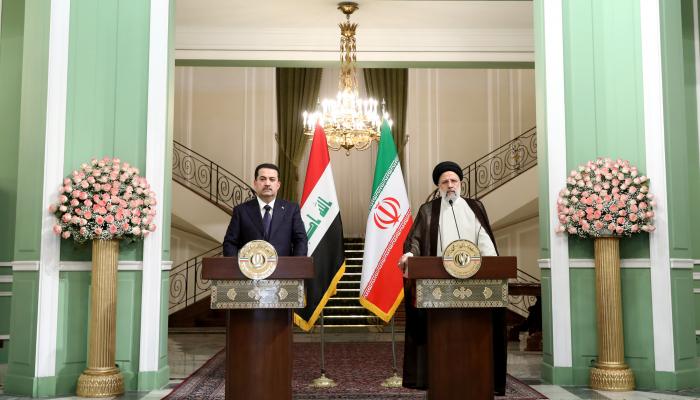Regarding the importance and strategic aspects of the new Iraqi Prime Minister’s visit to Iran, which was carried out with security, political and economic goals, the following can be mentioned:
One; The mentioned trip took place while we have witnessed certain developments in the relations between the two countries in recent weeks. The targeting of terrorist centers in the Kurdistan region of Iraq, which planned and acted against the interests of the Islamic Republic of Iran, as well as the serious request of the Iranian government to the Baghdad government to control the common borders of the two countries in the Kurdistan region, are at the top of the mentioned developments.
In the past weeks, when General Qaani traveled to Iraq at the head of a high-ranking delegation, in a meeting with high Iraqi officials, he reflected Tehran’s decisive position regarding the activities of more than 70 active terrorist and separatist centers in Iraqi Kurdistan against the Islamic Republic of Iran. Baghdad wanted to prevent the activity of anti-Iranian groups and remove them from the border areas with Iran. It seems that Sudani, understanding Iran’s sensitivities regarding the mentioned events, has preferred to travel to Iran with his hands full in response to Iran’s recent request. Therefore, between General Qaani’s trip to Baghdad and the Iraqi Prime Minister’s trip to Tehran, Al-Sudani had reached an important agreement about Iran’s request with Nichervan Barzani.
According to the agreement, military units from the Peshmerga forces, the army and border guard forces of the central government of Iraq will be stationed along the 200-kilometer border with Iran. During his recent trip to Tehran, al-Sudani explained the details of Baghdad’s agreement with the Kurdistan Region.
Two; Al-Sudani is a veteran, experienced and well-known politician in the political environment inside Iraq and has special and cordial relations with the Islamic Republic of Iran. He is also supported by the majority of the Islamic resistance groups in Iraq, and the people of Iraq have a positive view of him due to his simplicity, cheerfulness and public spirit.
From this point of view, choosing Tehran as the destination of the first foreign trip to a non-Arab country, although it was done at the invitation of the President of Iran, shows that Al-Sudani has opened a special account on Iran in foreign policy and to advance the affairs of Iraq. In addition, solving the economic problems and the crisis of poverty and unemployment are among the main priorities of the new government, which despite being difficult to solve, with effective domestic efforts and planning, the balance of Iraq’s relations with Iran, the US and Saudi Arabia, as well as the use of the capacities of neighboring countries, especially Iran, can be achieved.
In this regard, the activation of the joint economic committees of the two countries in order to increase the level of trade exchanges from the current 13 billion dollars to 20 billion dollars, as well as his efforts to get Tehran’s agreement to continue the process of Iran’s electricity export to Iraq until the completion of electricity and gas projects in this country are among the important achievements of Al-Sudani’s visit to Tehran. In addition, in the field of payment of Iraq’s 7 billion dollar debt to Iran, Al-Sudani promised to make efforts in this field by using new mechanisms.
Three; Iraq is a “special country” in the foreign relations of the Islamic Republic of Iran, which has always had an important and strategic position in Iran’s foreign policy. Martyr Soleimani also believed that no country after the Islamic Republic of Iran has the capacity of Iraq to create Islamic civilization and confront the plans of the enemies of the Islamic nation.
Planning the Iraqi Prime Minister’s visit to Iran is considered a realistic and prudent policy on the part of the government of the Islamic Republic of Iran and shows that the Islamic Republic of Iran is still seeking to consolidate and develop foreign relations with neighboring countries, especially Iraq, in line with the “neighborhood policy”.
Regarding the “strategic consequences” of Mohammad Shia al-Sudani’s trip to Tehran, it seems that, firstly, this trip will impact the acceleration of the the continuation of the Iran-Saudi dialogue process, which started with the hosting and mediation of Baghdad and has been stopped in recent months due to the Saudi involvement in the recent events of the country.
Of course, because Iraq is directly influenced by the relations between Iran and Saudi Arabia, al-Sudani also insists that the differences between the countries be resolved as soon as possible so that this country can benefit from its positive effects and results.
Secondly, al-Sudani’s trip to Iran and possibly his subsequent trip to Saudi Arabia will also determine the fate of some regional cases that are somehow related to the future of Iraq. But the important point regarding Iran is to draw a favorable perspective in political and economic relations with Baghdad. This issue will definitely be effective in solving many internal and external problems of Iraq with the help and cooperation of Iran.
In conclusion, it should be emphasized that the special view of the Islamic Republic of Iran on Iraq is a unique opportunity for the current government of Iraq to use Iran’s economic, political, security, military and other potentials and facilitate the process of realization of goals and promises as well as perspectives he has defined for his government. In this regard, Tehran is ready to provide any assistance to the new Iraqi government to improve the internal and external affairs of Iraq so that the country returns to its historical role.










0 Comments